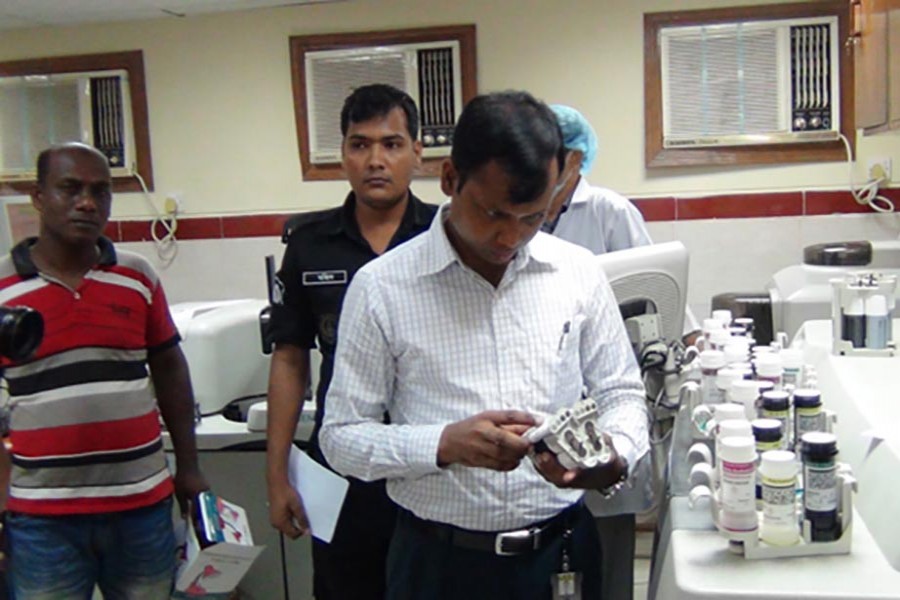
Published :
Updated :

There is a mushroom growth of diagnostic centres and private clinics all over the country in recent times. Most of the roads, lanes and bi-lanes of the cities are witnessing speedy growth of such centres.
A diagnostic centre needs clearances from many government agencies for running its business. The agencies include the Department of Environment, the Fire Service and Civil Defence, Bangladesh Standards and Testing Institution, respective city corporations and some other authorities.
But many of them have allegedly been operating their business through fake clearances. How could they manage such clearances and run their business openly is anybody's guess. Here, the role the law enforcing agencies is evidently under question.
In order to cater to the growing demands of healthcare services, the private sector took most of the initiatives to open such centres. But the quality of service of the healthcare workforce in these diagnostic centres is simply awful. The government recognises three types of degrees for technical personnel - one-year diploma, three-year graduation and four-year BSc in laboratory technology course. It is easily understood that the quality between one-year and four-year degree holders will not be the same.
Healthcare is one of the vital sectors for which the government allocates a sizeable amount of money every year. But widespread irregularities in services have made the system ineffective. Studies have shown that of all the risks that poor households are facing, health risks pose the greatest threat to their lives and livelihood in the country. Unfortunately, healthcare system, for the most part, is ineffective in reaching the poor, generate less benefit for the poor than the rich, and impose repressive cost burdens on poor households.
There are also allegations that a good number of diagnostic centres are using names of expert physicians in their signboards but the physicians do not sit there. The Anti-Corruption Commission (ACC), the country's anti-graft body, has also received allegations that a some diagnostic centres and private clinics are involved in money laundering also in the name of consultancy and processing of treatment abroad without any approval.
The country's anti-graft body is reported to have started investigation against a number of high profile hospitals and diagnostic centres in the capital recently amid allegations of money laundering, tax dodging, charging high fees from the patients and other irregularities. The investigation was initiated after a three-member scrutiny committee of the anti-graft body came up with recommendation for taking action on the complaints against 10 high profile hospitals and diagnostic centres of the country.
In a recent drive against unscrupulous health service providers, a mobile court in Dhaka fined some diagnostic centres Tk 2.2 million for using date-expired chemicals and other irregularities. These centres take great pride in their services and brand name, and usually cater to the high-end patients.
Date-expired chemicals are being used in pathological tests in different private clinics, hospitals and diagnostic centres in the capital. Such outdated chemicals, which are mixed with other chemicals, make clinical report wrong for which the total treatment procedure is likely to be wasted. Some date-expired medicines were also seized by Rapid Action Battalion (RAB) recently.
Such seizure of date expired laboratory ingredients from the possession of a number of hospitals and diagnostic centres is a reflection not only of gross negligence but also of criminality in dealing with public health. Regrettably, malpractices of such centres are very much frequent in the country. In the recent years, hundreds of reports were published in the newspapers about unauthorised hospitals, clinics and their wrong treatments.
There is no denying that substandard or fake diagnostic centres are doing brisk business in the country. Patients generally go there for conducting medical tests as prescribed by the doctors. But many of these centres lack skilled manpower and necessary equipment, and hence faulty pathology reports are not uncommon. The patients then get inaccurate treatment and wrong medication.
Absenteeism of doctors at public hospitals, clinics and health centres, adulterated medicine in the markets, lack of government's control on prices of medicines, pilferage of medicines meant for free distribution, deception of fake doctors, unethical and unlawful nexus between a section of doctors and private diagnostic centres, clinics and pharmaceutical companies and irregularities of private medical institutions in providing standard medical education are some of the factors that leave a crippling effect on the sector.
Unethical practice by a section of doctors is very much common. Some of them allegedly use various post-graduate degrees before completion of their courses. According to the Bangladesh Medical and Dental Council (BMDC), the statutory body with the responsibility for recognition of medical qualifications in the country, no doctor can write a degree besides MBBS until the results of the degree come to hand. But, in practice, many do mention degrees like FCPS part-1 or final part or MD final part violating the standard norms. Common patients, most of whom have no idea about what these expressions mean, consult these doctors thinking they are specialists and get cheated.
Health service in the private sector needs to be streamlined. This is, however, not possible unless a proper mechanism is in place. On its part, the government needs to initiate a move to create a legal framework so as to ensure quality treatment. In fact, a holistic approach will be required in order to provide full-scale free healthcare to the disadvantaged. Otherwise, the concept 'Health for All' is not expected to be materialised any time soon.
In the circumstances, the government needs to help improve the management of the errant diagnostic centres by strictly enforcing relevant laws and regulations. Frequent raids by mobile courts should continue to ensure some discipline in the functioning of such centres.


 For all latest news, follow The Financial Express Google News channel.
For all latest news, follow The Financial Express Google News channel.